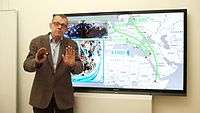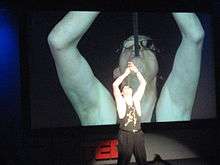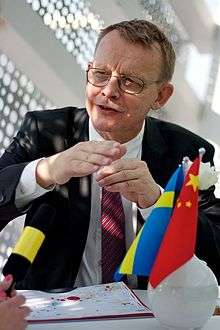Hans Rosling
| Hans Rosling | |
|---|---|
|
Rosling at the 2012 Time 100 gala | |
| Born |
27 July 1948 Uppsala, Sweden |
| Institutions | Karolinska Institutet |
| Alma mater |
Uppsala University St. John's Medical College |
| Thesis | Cassava, Cyanide, and Epidemic Spastic Paraparesis: A Study in Mozambique on Dietary Cyanide Exposure (1986) |
| Known for |
Gapminder Foundation Trendalyzer |
Hans Rosling (born 27 July 1948)[1] is a Swedish medical doctor, academic, statistician, and public speaker. He is the Professor of International Health at Karolinska Institutet[2] and co-founder and chairman of the Gapminder Foundation, which developed the Trendalyzer software system. He rose to international celebrity status after producing a Ted Talk in which he promoted the use of data to explore development issues.
Biography
Rosling was born in Uppsala, Sweden. From 1967 to 1974 Rosling studied statistics and medicine at Uppsala University, and in 1972 he studied public health at St. John's Medical College, Bangalore, India. He became a licensed physician in 1976 and from 1979 to 1981 he served as District Medical Officer in Nacala in northern Mozambique.
On 21 August 1981, Rosling discovered an outbreak of konzo, a paralytic disease,[3][4] and the investigations that followed earned him a Ph.D. degree at Uppsala University in 1986. He spent two decades studying outbreaks of this disease in remote rural areas across Africa and supervised more than ten Ph.D. students. Outbreaks occur among hunger-stricken rural populations in Africa where a diet dominated by insufficiently processed cassava results in simultaneous malnutrition and high dietary cyanide intake.[4]
Rosling's research has also focused on other links between economic development, agriculture, poverty and health.[5] He has been health adviser to WHO, UNICEF and several aid agencies. In 1993 he was one of the initiators of Médecins Sans Frontières in Sweden.[6] At Karolinska Institutet he was head of the Division of International Health (IHCAR) from 2001 to 2007. As chairman of the Karolinska International Research and Training Committee (1998–2004) he started health research collaborations with universities in Asia, Africa, the Middle East and Latin America. He started new courses on Global Health and co-authored a textbook on Global Health that promotes a fact-based world view.
Rosling presented the television documentary The Joy of Stats, which was broadcast in the United Kingdom by BBC Four in December 2010.[7] He presented a documentary Don't Panic – The Truth About Population for the This World series using a Musion 3D projection display,[8] which appeared on BBC Two in the UK in November 2013.[9] In 2015, he presented the documentary Don't Panic: How to End Poverty in 15 Years, which was produced by Wingspan and aired on the BBC just ahead of the annunciation of the Sustainable Development Goals.[10][11]
Gapminder

 | |
|
| |
|
| |
|
|
Rosling co-founded the Gapminder Foundation together with his son Ola Rosling and daughter-in-law Anna Rosling Rönnlund. Gapminder developed the Trendalyzer software that converts international statistics into moving, interactive graphics. His lectures using Gapminder graphics to visualise world development have won awards.[15] The interactive animations are freely available from the Foundation's website. On 16 March 2007 Google acquired the Trendalyzer software with the intention to scale it up and make it freely available for public statistics. In 2008 Google made available a Motion Chart Google Gadget and in 2009 the Public Data Explorer.[16] Rosling is also a sword swallower, as demonstrated in the final moments of his second talk at the TED conference.[17] In 2009 he was listed as one of 100 leading global thinkers by Foreign Policy Magazine,[18] and in 2011 as one of 100 most creative people in business by the Fast Company Magazine.[19] In 2011 he was elected member of the Swedish Academy of Engineering Sciences and in 2012 as member of the Swedish Academy of Sciences.
Personal health
When he was 20, doctors told Rosling that there was something wrong with his liver and as a consequence Rosling stopped drinking alcohol. In 1989, Rosling was diagnosed with hepatitis C. Over the years this progressed and Rosling developed liver cirrhosis. In the beginning of 2013 he was in early stages of liver failure. However, at the same time new Hepatitis C drugs were released and Rosling went to Japan to buy the drugs needed for curing the infection. He has since expressed concerns in media over the restricted use of the new drugs due to high costs, stating that it is a crime to not give every person with hepatitis C access to the drugs.[20][21][22]
Awards

- 2007 – Statistician of the Year Award from the Swedish Association for Statistics
- 2007 – Jubilee Prize from the Swedish Medical Society
- 2007 – Knowledge Prize from the National Encyclopaedia of Sweden
- 2008 – Speaker of the Year from the Swedish Event Academy
- 2008 – The Big Debate Award from Dagens Medicine
- 2009 – Georg and Greta Borgstrom Award from the Swedish Royal Academy of Agriculture and Forestry
- 2010 – Illis Quorum, Highest Award conferred by the Government of Sweden
- 2010 – The Grand Prize from the Royal Institute of Technology, Stockholm, Sweden
- 2010 – Gold Medal from Royal Swedish Academy of Engineering Sciences
- 2010 – World Technology Award in Design together with Ola Rosling & Anna Rosling Rönnlund
- 2010 – The Gannon Award for the Continued Pursuit of Human Advancement (US)[23]
- 2011 - Grierson 2011 Award for the Best British Science Documentary, presenter in "The Joy of Stats"
- 2012 - Time 100 most influential people list
- 2012 - International Swede of the Year
- 2014 - Honorary Doctor at Uppsala University, Sweden[24]
- 2014 - The Royal Patron´s Medal from the Royal Geographical Society of London.
- 2014 - Honorary Doctor at the Open University, United Kingdom.
- 2014 - Honorary Doctor at University of Oslo, Norway.
Selected publications
- Thorson, A.; Ragnarsson, A.; Rosling, H.; Ekström, A. (2010). "Male circumcision reduces HIV transmission. The risk of transmission from woman to man is halved". Lakartidningen. 107 (46): 2881–2883. PMID 21197783.
- Hanson, S.; Thorson, A.; Rosling, H.; Örtendahl, C.; Hanson, C.; Killewo, J.; Ekström, A. M. (2009). Husereau, Don, ed. "Estimating the Capacity for ART Provision in Tanzania with the Use of Data on Staff Productivity and Patient Losses". PLoS ONE. 4 (4): e5294. doi:10.1371/journal.pone.0005294. PMC 2667213
 . PMID 19381270.
. PMID 19381270. - Von Schreeb, J.; Riddez, L.; Samnegård, H.; Rosling, H. (2008). "Foreign field hospitals in the recent sudden-onset disasters in Iran, Haiti, Indonesia, and Pakistan". Prehospital and disaster medicine : the official journal of the National Association of EMS Physicians and the World Association for Emergency and Disaster Medicine in association with the Acute Care Foundation. 23 (2): 144–151; discussion 151–3. PMID 18557294.
- Schell, C. O.; Reilly, M.; Rosling, H.; Peterson, S.; Ekström, A. M. (2007). "Socioeconomic determinants of infant mortality: A worldwide study of 152 low-, middle-, and high-income countries". Scandinavian Journal of Public Health. 35 (3): 288–297. doi:10.1080/14034940600979171. PMID 17530551.
- Von Schreeb, J.; Rosling, H.; Garfield, R. (2007). "Mortality in Iraq". The Lancet. 369 (9556): 101. doi:10.1016/S0140-6736(07)60058-0. PMID 17223462.
- Elrayah, H.; Eltom, M.; Bedri, A.; Belal, A.; Rosling, H.; Ostenson, C. (2005). "Economic burden on families of childhood type 1 diabetes in urban Sudan". Diabetes Research and Clinical Practice. 70 (2): 159–165. doi:10.1016/j.diabres.2005.03.034. PMID 15919129.
- Thanh, H. T. T.; Jiang, G. X.; Van, T. N.; Minh, D. P. T.; Rosling, H.; Wasserman, D. (2005). "Attempted suicide in Hanoi, Vietnam". Social Psychiatry and Psychiatric Epidemiology. 40 (1): 64–71. doi:10.1007/s00127-005-0849-6. PMID 15624077.
- Rosling, H. (2004). "New map of world health is needed. North and South is changed to healthy and ill and West to rich and poor". Lakartidningen. 101 (3): 198–201. PMID 14763091.
References
- ↑ "Hans Rosling: Asia's rise -- how and when". TED Conferences. November 2009. Retrieved 6 December 2009.
- ↑ "Hans Rosling". Karolinska Institutet.
Professor of Public Health Science at the Department of Public Health Sciences since 1997
- ↑ Trolli, G (1938). "Paraplégie spastique épidémique,'Konzo'des indigènes du Kwango". Résumé des observations réunies, au Kwango. Brussels.
- 1 2 Howlett, W. P.; Brubaker, G. R.; Mlingi, N.; Rosling, H. (1990). "Konzo, an Epidemic Upper Motor Neuron Disease Studied in Tanzania". Brain. 113: 223–235. doi:10.1093/brain/113.1.223. PMID 2302534.
- ↑ Hans Rosling (2006). Global Health: An Introductory Textbook. Studentlitteratur AB,Sweden. ISBN 91-44-02198-4.
- ↑ "Hans Rosling: 'No such thing as Swedish values' - The Local". Retrieved 2015-09-27.
- ↑ "The Joy of Stats". BBC Four. Archived from the original on 2 December 2010.
- ↑ "BBC - Hans Rosling returns to BBC for series of programmes on population - Media Centre". Retrieved 23 September 2015.
- ↑ "Don't Panic – The Truth About Population". BBC Two. Archived from the original on 5 November 2013. Retrieved 8 November 2013.
- ↑ "This World, Don't Panic - How to End Poverty in 15 Years". BBC iPlayer. Retrieved 2015-09-26.
- ↑ The Gapminder's website lists information on the empirical data and research used as the basis for the documentary "Don’t Panic, How to End Poverty": http://www.gapminder.org/news/data-sources-dont-panic-end-poverty/ The sources used are World Bank data, Overseas Development Institute data, research results by Branko Milanovic, Our World in Data, and information from the Demographic and Health Surveys program. The research team included Hans Rosling, Max Roser, and Ola Rosling.
- ↑ "The Best Stats You've Ever Seen". TED Talks. February 2006. Retrieved 4 October 2015.
- ↑ "Hans Rosling: Religions and babies". TED Talks. April 2012. Retrieved 4 October 2015.
- ↑ "How Not to Be Ignorant About the World". TED Talks. February 2014. Retrieved 4 October 2015.
- ↑ "Awards". Gapminder. Archived from the original on 17 January 2009.
- ↑ "Public data explorer". Google. April 2010. Retrieved 16 May 2010.
- ↑ "Hans Rosling's new insights on poverty". TED Conferences. March 2007. Archived from the original on 25 February 2009. Retrieved 6 December 2009.
- ↑ "Top 100 Global Thinkers 2009". Foreign Policy. December 2009. Archived from the original on 1 December 2009. Retrieved 16 May 2010.
- ↑ "100 Most Creative in Business 2011". Fast Company. May 2011. Archived from the original on 21 May 2011. Retrieved 23 May 2011.
- ↑ Hans Rosling om sin egen hepatit C-behandling - Nyhetsmorgon (TV4). 9 July 2014 – via YouTube.
- ↑ "Hans Rosling: läkare måste stå upp för sina hepatitpatienter".
- ↑ "Nu kan hepatit C botas – men många får vänta". DN.SE.
- ↑ "Dr. Hans Rosling". The Gannon Award.
- ↑ "Hans Rosling one of four new honorary doctors at Faculty of Science and Technology - Uppsala University, Sweden". www.uu.se. Retrieved 2016-02-03.
External links
 Quotations related to Hans Rosling at Wikiquote
Quotations related to Hans Rosling at Wikiquote- Hans Rosling shows the best stats you've ever seen at the 2006 TED Conference in Monterey, CA highlighting novel ways of presenting global statistics.
- Hans Rosling's new insights on poverty, from TED2007, featuring a surprise ending. (video)
- Hans Rosling's blog
- Ola Rosling giving a Gapminder presentation at Google (video)
- Motion Chart Google Gadget
- Hans Rosling: Global health expert; data visionary profile on TED.com
- Hans Rosling on Twitter